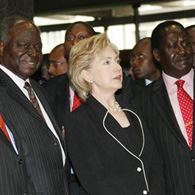 Secretary of State Hillary Clinton had good news for Africa in the Nairobi forum yesterday on the US African Growth and Opportunity Act (AGOA). AGOA offers breaks from quotas and duties on African exports to the US. First enacted under Bush, AGOA is at least a partial success story, with exemplars like textile exports in Lesotho and Madagascar. Secretary Clinton yesterday endorsed new efforts to “maximize the promise of AGOA.” She declared “we are committed to trade policies that support prosperity and stability.”
Except when we aren’t. AGOA privileges can be revoked for political reasons, like if the President and the US Trade Representative (USTR) decide a country does not have sufficient “rule of law.”
Secretary of State Hillary Clinton had good news for Africa in the Nairobi forum yesterday on the US African Growth and Opportunity Act (AGOA). AGOA offers breaks from quotas and duties on African exports to the US. First enacted under Bush, AGOA is at least a partial success story, with exemplars like textile exports in Lesotho and Madagascar. Secretary Clinton yesterday endorsed new efforts to “maximize the promise of AGOA.” She declared “we are committed to trade policies that support prosperity and stability.”
Except when we aren’t. AGOA privileges can be revoked for political reasons, like if the President and the US Trade Representative (USTR) decide a country does not have sufficient “rule of law.”
Which is exactly what is threatened now with that success story of textiles in Madagascar. Ever since a political crisis and change in government in Madagascar last spring, the USTR has been threatening to revoke Malagasy eligibility for AGOA, which would effectively destroy the Malagasy textile industry (worth between 6.5 and 8 percent of GDP and accounting for 50,000 jobs).
We had a previous blog post on this, which had a dramatically nonexistent effect on USTR actions.
Of course, the USTR implementing AGOA has good intentions – to promote good governance. There are two problems with this: (1) we don’t have a clue how to do this in Madagascar, and (2) why try to do it by punishing private individuals instead of the government?
On (1), Malagasy politics are not really that hard to understand, as long as you have a Ph.D. in Malagasy history, political science, sociology, economics, and familiarity with the byzantine maneuvers of the FOUR way-far-from-perfect quarreling rivals for power. All the US government asks in exchange for continuing AGOA is that these four guys who hate each other come to an instantaneous consensus on early, free, and fair elections. USTR officials confirmed to us on background yesterday that these efforts continue.
It’s not totally clear why USTR is being so insistent, when “rule of law” is so vague as to allow the eligibility of DRC, Guinea, and Guinea Bissau (as we ineffectively pointed out last time). (This arbitrariness is what justifies the snarky title of this post.)
On (2), all I have to say to elaborate on “why punish private individuals”, is – why punish private individuals?
Time is running out for Madagascar, as incentives to invest and produce for advance US orders are disappearing further the longer the USTR dithers. Political risk comes not from the Malagasy or other African governments, but from the US government’s failure to follow any consistent rule of law on how to apply the AGOA rule of law provision. This arbitrariness weakens the AGOA incentives for ALL African countries.
Please USTR, try to make Secretary of State Clinton’s promising words come true, don’t throw away one of our all-too-scarce development policy successes.
 In today's NYT :
In today's NYT :
 From Aid to Equality
From Aid to Equality

 Secretary of State Hillary Clinton had good news for Africa in the Nairobi forum yesterday on the US African Growth and Opportunity Act (AGOA). AGOA offers breaks from quotas and duties on African exports to the US. First enacted under Bush, AGOA is at least a partial success story, with exemplars like textile exports in Lesotho and Madagascar. Secretary Clinton yesterday
Secretary of State Hillary Clinton had good news for Africa in the Nairobi forum yesterday on the US African Growth and Opportunity Act (AGOA). AGOA offers breaks from quotas and duties on African exports to the US. First enacted under Bush, AGOA is at least a partial success story, with exemplars like textile exports in Lesotho and Madagascar. Secretary Clinton yesterday